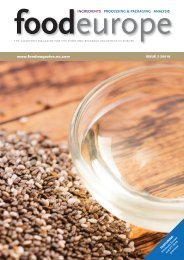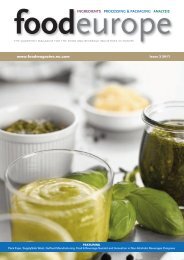Issue 3 2019
Create successful ePaper yourself
Turn your PDF publications into a flip-book with our unique Google optimized e-Paper software.
ingredients<br />
23<br />
knowhow and tools to do it.<br />
Roots in digestive health<br />
In its annual trend forecast<br />
for food, nutrition and health,<br />
New Nutrition Business put<br />
fermentation right up there for<br />
<strong>2019</strong>, highlighting consumers’<br />
strong interest in exciting product<br />
offerings that match their health<br />
beliefs. This demand is broadly<br />
inspired by restauranteurs,<br />
bloggers and journalists, who<br />
share their experiences with<br />
fermentation and fermented<br />
products via social media<br />
channels. Food manufacturers are<br />
responding to suit through their<br />
own product development.<br />
Ingredient supplier DuPont<br />
Nutrition & Biosciences has<br />
been following the growing<br />
fermentation market closely. Here,<br />
strategic marketing manager<br />
for beverages, Leonardo Rubio<br />
Anselmi puts a firm finger on the<br />
digestive wellness trend as the<br />
starting point for the fermentation<br />
movement.<br />
“Since the food industry<br />
started to talk about probiotics,<br />
consumers have learned to<br />
associate gut bacteria with<br />
something that is good for them.<br />
Fibre has also been advocated as<br />
important to digestive wellness,<br />
especially because most of us<br />
don’t eat enough.<br />
“While, in the EU, rulings by the<br />
European Food Safety Authority<br />
have made it difficult to base a<br />
digestive health claim around a<br />
probiotic culture, consumers have<br />
generally come to recognise the<br />
healthy halo around fermentation.<br />
It is this recognition that drives<br />
the sales of a product like<br />
kombucha, which is a fermented<br />
tea.<br />
“If it were possible to make more<br />
nutritional or health claims on<br />
the packaging, then it is very<br />
likely that kombucha would move<br />
even faster into mainstream<br />
consumption,” Anselmi suggests.<br />
A resourceful tradition<br />
For centuries, fermentation<br />
was merely a simple means of<br />
preserving fresh produce beyond<br />
the end of the harvest. In South<br />
Korea, the art of producing<br />
fermented kimchi, for example,<br />
began with a basic need to<br />
preserve vegetables and secure<br />
a safe supply of food during the<br />
cold winter months. Kimchi has<br />
since become so much part of the<br />
local food culture that even now,<br />
when food is ample all year round,<br />
this spicy fermented vegetable<br />
dish is still served with almost<br />
every traditional South Korean<br />
meal.<br />
As more<br />
manufacturers turn<br />
their attention to<br />
developing plantbased<br />
fermented<br />
products, a mix of<br />
trends around dairy<br />
alternatives and<br />
sugar reduction can<br />
create a confusing<br />
picture about what<br />
consumers actually<br />
want<br />
Fermentation continues to play<br />
an important role in turning local<br />
produce or even food waste, such<br />
as fruit and vegetable peel, into<br />
an affordable and safe source<br />
of nutrition – contributing to<br />
more sustainable use of scarce<br />
resources. Nevertheless, it is<br />
the health aspects that today<br />
are driving the mainstream<br />
development of kimchi and other<br />
ethnic fermented foods.<br />
“In addition to the strong<br />
association with probiotics, we<br />
know from market research that<br />
consumers increasingly perceive<br />
fermented foods and beverages<br />
as natural, clean label and a rich<br />
source of nutrients,” Anselmi<br />
explains.<br />
“As more products are launched,<br />
consumers are learning as well<br />
that fermentation can turn a<br />
less palatable plant base into<br />
a convenient, delicious and<br />
nutritious product. Fermented<br />
beverages, in particular, meet<br />
the consumer desire for healthy<br />
refreshment.”<br />
What the consumer wants<br />
However, as more manufacturers<br />
turn their attention to developing<br />
plant-based fermented products,<br />
a mix of trends around dairy<br />
alternatives and sugar reduction<br />
can create a confusing picture<br />
about what consumers actually<br />
want.<br />
DuPont senior fresh fermented<br />
dairy specialist Kirsten Lauridsen<br />
relates an experience from a<br />
recent major trade fair.<br />
“We always take a few concept<br />
samples for visitors to taste at<br />
such events. In this case, we<br />
had brought along a fermented<br />
oat snack. While we found that<br />
representatives from dairy<br />
companies rejected the snack<br />
because it tasted too little like a<br />
standard yoghurt, consumers who<br />
visited our stand were extremely<br />
positive about it.<br />
“So the question is whether socalled<br />
dairy alternatives need<br />
to have a dairy taste? Or are<br />
consumers more than happy<br />
to taste the plant base? It’s<br />
important to have this interaction<br />
with consumers to find out.”<br />
Beverage manufacturers could<br />
ask themselves a similar question<br />
when developing new soft drinks<br />
with a low sugar content. Is<br />
the best approach always to<br />
reproduce the familiar taste of a<br />
well-known brand using a sugar<br />
alternative? Or is there a strong<br />
business case for developing<br />
plant-based fermented beverages<br />
that have a natural fizz of their<br />
own? The rising popularity of<br />
kombucha, which is both lightly<br />
effervescent and naturally low<br />
in sugar, suggests that the<br />
fermented route could be a good<br />
way to go.<br />
Learning from ethnic practices<br />
At the DuPont application labs,<br />
www.foodmagazine.eu.com issue three <strong>2019</strong>
















